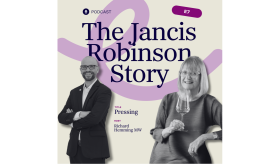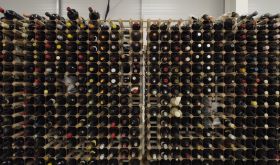Last week Alain Senderens, the cerebral, wine loving chef/proprietor of the art nouveau Lucas Carton restaurant in Paris announced that he was handing back the three Michelin stars he has held for over 20 years. He will close the restaurant in July and re-open it in September serving simpler, less expensive fare because at the age of 65, as he concisely put it, “I want to do something different and to have some fun.”
This decision naturally made the front pages of all the leading French papers and has been picked up by many others as yet another nail in the coffin of the once revered Michelin Guide in particular and of French haute cuisine in general. But as with all such seemingly important decisions it is the context and the timing of this announcement which are as significant as the decision itself.
Undoubtedly, the most important aspect of Senderens’ decision is what it is not – happily, for anyone who has eaten his food or who wants to do so in the future, he has not announced his retirement. Having stood for almost 50 years by hot stoves (like many top chefs he started in his late teens) and reached an age when many do hang up their aprons, as Nico Ladenis did when he returned his three Michelin stars in 1999, Senderens will carry on in his stimulating quest to combine the best that Nature can provide. And now his accumulated wisdom will be more widely available because it will be less expensive and more informal.
One only has to think of the contribution that Senderens’ colleague Joël Robuchon, who turned 60 quite recently, has made since abandoning his formal, expensive style of cooking a few years ago to appreciate the potential of Senderens’ decision.
Robuchon decided to combine the menu of a Spanish tapas bar with the layout of a Japanese sushi counter underpinned by classic French cooking techniques to open L’Atelier du Robuchon to great success in Paris, then Tokyo with branches coming to Las Vegas and New York soon. It is not just the food which attracts the crowds despite a no-booking policy but the prices and above all the fact that the layout has broken the long standing physical barriers between the front of house and the kitchen. Freed from Michelin’s constraints, could the equally incisive Senderens achieve something similar? I do hope so.
Senderens made an equally valid point when he added that he is not handing back his Michelin stars because he believes the world of haute cuisine is finished. Like other great art forms – opera, music, painting and its sibling wine making – this style of cooking depends not just on talented practitioners but also on patronage and custom. But restaurants, good food and wine are now so much a part of the global market and with so many wealthy individuals still prepared to pay for the best, that it seems unlikely that the most talented chefs will ever lack for backing or custom.
Instead, the real threat in Senderens’ decision is to those whose fate has been most closely associated with this talented chef but who seem intent on believing that this decision is a one-off.
The first group is obviously the French themselves. To any Francophile the series of decisions which have so unbalanced the country’s restaurants over the past few years – the 35 hour week, the excessively high VAT rate applicable on restaurant charges and the recent decision not to accept any liberalisation in their service industries – seem like a series of increasingly successful attempts at economic suicide. Of course French chefs must hold on to what makes them unique but as the best have done, and their winemaking compatriots have done to even greater effect, they must also embrace the changes in how the rest of the world works and chooses to spend its leisure time and hard earned cash.
The second group most directly affected is obviously the Michelin Guides themselves and it is sad but perhaps inevitable to report that their reaction smacked of the small remaining band of ‘flat earthers’. A spokeswoman commented that the stars were not Senderens to give back – as though the Michelin Guide would be worth buying were it not for the hard working chefs and restaurateurs who give it its ‘raison d’être’. Instead, she continued, it was still possible for Senderens to receive his three stars in the next edition, a situation akin to an Olympic athlete receiving a gold medal for a race he has not entered.
Michelin has been in disarray for some time, its credibility undermined by the revelations of Pascal Remy, a former inspector, its pulping of this year’s Benelux guide after mistakenly awarding a high rating to a restaurant that was in fact still a building site and its decision to produce a guide to New York later this year when so much is wrong in its own backyard of France and Europe. But this is sadly a fate Michelin deserves by continuously refusing to list clearly its criteria for its ratings to a restaurant industry that has no time for secrets, to an eating out public rendered increasingly knowledgeable through such guides as Zagat and Harden’s and to a world fast growing used to freedom of information in general.
Chefs and restaurateurs at this level face a challenging future – to offer less extravagant but more refined food and increasingly professional, friendlier service without raising prices. With this brave decision Senderens has ensured that Lucas Carton will be able to achieve this. He deserves to be the toast of France.













